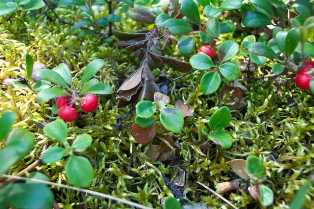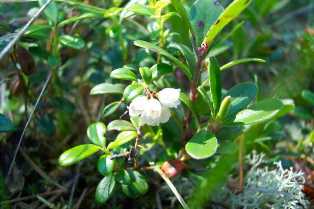Bearberry, Uva-ursi, Kinnikinnick
 |
 |
Description
Bearberry (Arctostaphylos uva-ursi (L.) Spreng., Ericaceae), is a prostrate, much-branched shrub in the heather family. It forms large mats, with spatula-shaped, smooth-edged, evergreen leaves, pinkish-white urn-shaped flowers, and dull red edible but mealy berries.
History And Uses
The fruit, although rather dry and mealy, can be eaten and may be cooked with other foods. The leaves can be dried and added to tobacco or used as a substitute. Traditional First Nations medicinal uses include a tea made from the roots that can be drunk to treat a persistent cough or to slow excessive menstrual bleeding. The stem decoction can be drunk to prevent miscarriage, to speed a woman’s recovery after childbirth, or to bring on menstruation. The leaf decoction can be drunk to treat bladder and kidney problems. The astringent fruit with grease can be given to a child to treat diarrhea. The main modern use for the leaves is as a diuretic (activity is probably rather minimal) and urinary tract antiseptic for infections of the bladder, urethra, and kidney.
Area Of Adaptation
Bearberry is common in woodlands on sandy hills, exposed rocks, eskers and river banks throughout Canada as far north as the tree limit (including northernmost Manitoba), in the western and northern USA, Greenland, Iceland and northern Eurasia.
Cultivation And Processing
Bearberry is not currently cultivated commercially in Canada. The commercial supply comes mainly from harvest from the wild in the US, Spain, Italy, the Balkans and the Commonwealth of Independent States (formerly USSR). It can however be grown as a very attractive ground cover. Processing involves gathering the leaves and drying them, after which they may be sold whole, coarsely chopped in herbal tea mixtures, or finely ground and encapsulated. The Saskatchewan Herb Database lists several sources of seeds.
Marketing
The leaves are sold in herbal teas, sometimes mixed with other herbs such as goldenseal root, dandelion root, gentian root, parsley leaves, etc. There are several diuretic and homeopathic products made from uva-ursi leaves registered with Health Canada.

